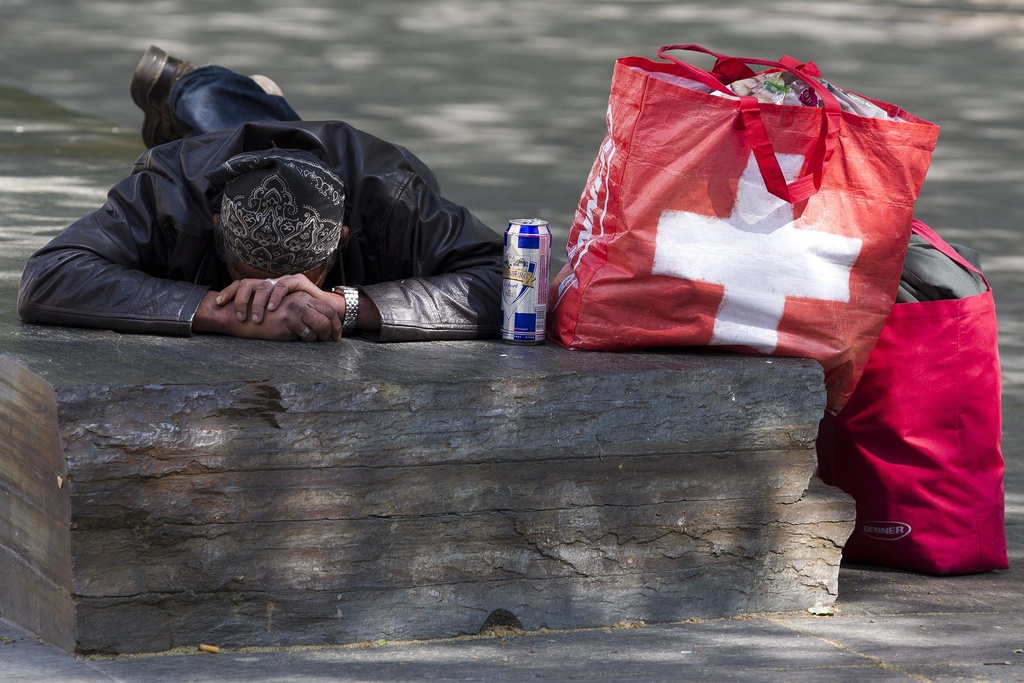Caritas shops cater to Switzerland’s poor

One person in 13 is affected by poverty in Switzerland. Caritas markets provide a solution for the growing number of people who have trouble getting by.
A bottle of fruit juice? SFr1.50 ($1.63) instead of SFr4.20. A kilo of sugar? Ninety cents instead of SFr1.20. Toilet paper? SFr1.95 instead of SFr5.95.
“The products we sell cost 30-50 per cent less than the normal price. To have a point of comparison, we filled a typical shopping cart for a family of four. It cost 52 francs with us, while in ordinary supermarkets it costs 100,” according to Corinne Saurant, who oversees two Caritas markets in canton Neuchâtel.
Opened in August 2011, the outlet near the centre of Neuchâtel is the latest in a long list. The first opened in Basel 20 years ago. Since then a further 22 have opened around Switzerland, and by 2020 Caritas expects the number of its shops to rise to 30.
Not just food
The shelves are well stocked, not just with foodstuffs. There is detergent, deodorant, soap, shampoo, baby nappies and even purses, towels and other personal items.
“It’s not the first time I have come here. You find all sorts of things, and a lot of the basics”, said a 23-year-old woman shopping in Neuchâtel when swissinfo.ch visited.
“I have a two-year-old child and shopping here means big savings. It means I can put a little money aside. If I don’t find what I need, I come back another time. If it’s urgent, I try another shop,” she said.
At times, bargain-hunting has to be kept within bounds. “Maximum of ten litres per day per family”, says a sign on the stack of milk cartons.
“Our aim is to help as many people as we can, so we may have to set limits to some customers’ purchases. That happens with tins of tuna, which sell out quickly,” Saurant told swissinfo.ch.
No product past its best
The Caritas markets are supplied by a food-bank cooperative in canton Lucerne which negotiates with the major distributors. Most of the products come from surplus stock, liquidations, supply errors or discontinued goods from more than 300 businesses, including Coop and Migros – the country’s two main retail distributors.
As a result, the selection may vary considerably from one week to the next.
“Coming up to Christmas we had very little chocolate, but afterwards the shelves were full of it. Now, for Easter, things are a bit better – we were able to get our hands on a supply of Easter bunnies”, said Saurant.
Since these are often surplus goods that will soon reach their sell-by date, Charles Rubeli, manager of the shop, is faced with the challenge of selling his stock fast enough.
“We follow the same rules as all retail outlets, and we can’t offer goods for sale that are past their best,” he explained to swissinfo.ch. However, really basic products are never missing.
“The food-bank cooperative gets them directly from the producers and we sell them at the same price that we get them for,” Saurant said. Supplies of a few other items, like coffee and cocoa, are guaranteed thanks to a partnership with the Denner budget retail chain, which has struck a deal to supply these items at a low cost.
Fruits and vegetables
Besides those food items, fruits and vegetables are sold at the purchase price. This is possible thanks to a project started in 2010 and funded by Health Promotion Switzerland, a federally-supported foundation which works to improve the country’s health.
As shown by numerous research studies, people with a low level of training – who are therefore more exposed to the risk of poverty – are more likely to suffer from obesity because they cannot afford a balanced diet. When someone’s budget is already reduced to the bare essentials, he is much more likely to buy rice or pasta than fresh produce.
“We have had very positive reactions and sales have grown rapidly,” said Saurant of the project. “I was struck when a mother told me, ‘Now at last I can put some fruit on the table’.”
Back to work
Besides providing welcome relief to many cash-strapped households, some of the Caritas markets are also helping unemployed people get back to work.
“Some shops operate with an all-volunteer staff apart from the manager. In ours, though, there are people working who depend on welfare. We have five to eight of them, with three-month contracts that can be extended. The objective is to help them to re-enter the workforce,” Saurant said.
“We need to be flexible and do a bit of coaching, because we are often dealing with people who have had pretty up-and-down lives,” Charles Rubeli told swissinfo.ch. “We also get different nationalities, and you may not be able to explain something the same way to a Tunisian as you do to an Afghan, say.”
These retail outlets do not cater to the public at large. To shop there, you need to be able to show a discount entitlement card, awarded on the basis of criteria which may vary from canton to canton.
“People have a right to this if they receive social assistance, extra payments from disability insurance or old age pension and survivor’s benefits, or who are getting subsidies for their medical insurance,” Saurant said. “Theoretically, that’s 25 per cent of the canton’s population.”
A growing business
Each day the Neuchâtel Caritas outlet serves 70 customers on average. The outlet in La Chaux-de-Fonds, which has just been expanded, serves about 100.
In 2011, the turnover of the 23 Caritas markets in Switzerland grew by 13 per cent to nine million francs. Compared to five years ago, the figure has doubled.
Canton Neuchâtel mirrors the national trend. “In 2011 in La Chaux-de-Fonds, we had a turnover of SFr390,000. Over the past three years we have seen a growth of 36 per cent. In Neuchâtel, for the first year of operation, we expect to reach a figure of SFr280,000.”
This is the kind of success which Saurant would prefer to do without. “I don’t know if we should be happy to be doing so much business,” she said. “Ideally, our shops shouldn’t need to exist.”
In 2010 there were 586,000 people living in poverty in Switzerland, according to data released at the end of March 2012 by the Federal Statistics Office.
This study suggests that in recent years poverty has declined: in 2010 the percentage of people living in poverty was 7.8%, as against 9.1% in 2008.
Single-parentfamilies are the worst hit and have the highest rate of poverty in absolute terms, at 26%.
Among persons living alone, 17% are living under the poverty line (SFr2,243 per month according to the Statistics Office). Taking only singles under the age of 65 into account, it is 11.4%.
The poverty level among young people under 18 is 7.6%, similar to the population overall. The levels are high, though, for persons over 65 (16%), in particular if they live alone (25.9%).
As might be expected, the lower the level of schooling, the higher the rate of poverty. Among persons with only a basic education, the percentage living in poverty is double that of those who got vocational training or graduated from secondary school.
The study is based on a random sample of 7,000 households (over 17,000 persons), interviewed over a period of four years.
Caritas Switzerland is a charity run by the Catholic Church. Its headquarters are in Lucerne. It was founded in 1901 on the model of the Caritas organisation in Germany.
At the outset, it focused on helping the needy within the national territory. Its first international involvement was in 1936, when the group came to the aid of victims in the Spanish Civil War.
Today in Switzerland, Caritas helps people in need and also asylum-seekers and refugees.
Abroad, it operates in more than 40 countries with some 350 development aid projects. It also provides emergency help in situations like natural disasters.
(Translated from Italian by Terence MacNamee)

In compliance with the JTI standards
More: SWI swissinfo.ch certified by the Journalism Trust Initiative













You can find an overview of ongoing debates with our journalists here . Please join us!
If you want to start a conversation about a topic raised in this article or want to report factual errors, email us at english@swissinfo.ch.